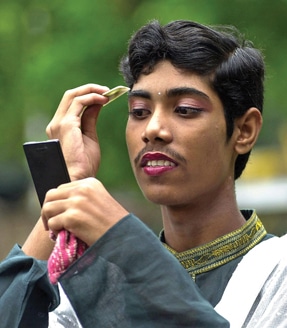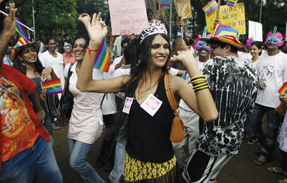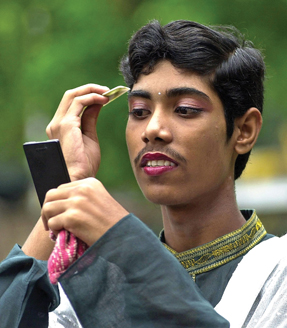|
Rajarshi, a 35-year old- college teacher near Kolkata is a
relieved man. After struggling with his sexual orientation for years, facing
persecution at home and outside, and grappling with a sense of guilt for years,
he feels a sense of relief that he is not a criminal for loving another man. He
is among the hundreds of thousands of gays and lesbians who are breathing
lighter after the Delhi High Court’s decision on July 2 decriminalizing
homosexuality.
Although Rajarshi came out of the closet after he graduated
in 1997, his family is still struggling to come to terms with his sexual
orientation. While his biggest support comes from his mother and sister, his
father and younger brother are hostile toward him. “When I first told my
father, he kept saying that it was nothing serious and that I will gain
interest in girls later on, maybe after marriage. However, when I made it clear
to him that I was not interested in girls, but in men, he disowned me. He
divided his property between my sister and younger brother. I did feel very
hurt, after all I might be gay, but I didn’t shirk from my responsibilities
toward my parents. I am his son too,” Rajarshi says, his voice wobbling with
emotion and hurt.
The Delhi High Court struck down a part of Section 377 of
the Indian Penal Code, which criminalizes homosexuality. The section was
introduced 150 years ago by the British and is a relic from India’s
colonial past. Although hardly anyone has been prosecuted under the law, it is
often used to intimidate, harass or blackmail gays. In 2001, the Naz Foundation
filed a petition in the Delhi High Court to strike down the law as it hindered
HIV/AIDS prevention work and was a violation of fundamental rights. The
National AIDS Control Organization (NACO), a government body, cited statistics
that showed 8 per cent of the gay population in India
is afflicted with HIV/AIDS compared to one per cent of the general population.
NACO said that Section 377 pushes the issue of AIDS underground.
After the Delhi High Court verdict, Amnesty International
released a statement applauding the decision. “The decision is a significant
step towards ensuring that people in India
can express their sexual orientation and gender identity without fear or
discrimination,” said Madhu Malhotra, Deputy Director, Asia Pacific, for
Amnesty International.
Veteran journalist, gay activist and editor of India’s first
gay magazine, Bombay Dost (which was re-launched in April this year) Ashok Row
Kavi said the Delhi High Court’s ruling is a “minor victory for poorer or
working class gay men.”
“The law was loaded
against the working classes. The upper classes never bothered with the law
anyway. They spoke English and got away from the police. It is the poor man,
the working class men who really bore the brunt of the law, which was used as a
tool for extortion and blackmail against them. So for me this is a victory for
them.” At the same time, Row Kavi added, “We have no time to rejoice and be
complacent as we still have the bigger hurdle to cross — discrimination.”
Anjali Gopalan, director of Naz says that the ruling is
“solid and grounded in a strong legal argument.” However, she feels that the
biggest challenge for gay rights in India
is acceptance. “How do you get society to accept homosexuality and how do you
get them to walk with you? It’s an arduous process, but it needs to happen.”
While the lesbian, gay, bisexual and transgender community
was celebrating the decision, dissenting voices from political and religious
circles made themselves heard. A Hindu astrologer, Sushil Kumar Kaushal has
appealed against the ruling to the Supreme Court. Kaushal said in his petition,
“If such abnormality is permitted, then tomorrow people might seek permission
for having sex with animals.”
He was followed by internationally acclaimed Yoga guru, Baba
Ramdev, who is also challenging the ruling in the Supreme Court. Other
religious leaders also weighed in. Akal Takht, the supreme body of Sikhs, said
it was not tolerable in Sikhism while the All India Muslim Personal Law Board
called homosexuality, “illegal, irreligious and unnatural.” The general
secretary of the Ecumenical Organization of Protestant and Orthodox
Churches in India
declared that homosexuality was “forbidden in the Bible.”
The ruling created a stir in Indian political circles as
well. Most senior leaders have been tightlipped. But others have jumped into
the fray. Former railway minister Laloo Prasad Yadav said, “Gay sex should not
be legalized at any cost.” He has an ally in Samajwadi Party leader Amar Singh
who said homosexuality was “taking undue advantage of personal freedom.” Former
health minister Anbumani Ramadoss, however, supported the decision: “This will
go a long way in fighting HIV/AIDS in India.
It is time the government acted quickly and brought in legislation.”
The ruling has spawned a national debate. Debanjan Banerjee,
a young professional, says, “I have nothing against homosexuality. However, I
do feel that it is not that important an issue as compared to say other issues
like poverty, women’s empowerment, child rights or developmental concerns. Too
much is being made of it.” Priya Mehta, a fashion designer, counters: “I have
many gay friends and being gay doesn’t change a person so I don’t understand
the arguments of the anti-gay lobby. Most of their arguments are totally
baseless. I feel happy that the Delhi High Court decriminalized Section 377. I
hope the rest of the country follows suit too.”
When Rajarshi realized that he doesn’t feel attracted
towards women, he confided in his childhood friend, who although supportive,
was dismissive of the problem as an “affliction.” He took Rajarshi to a
psychiatrist who told him that “being gay was an illness,” and told him to “get
over it and lead a normal life and get married.”
Naz’s Gopalan says that in India
“doctors use shock therapy to treat homosexuality. We really have a long way to
go before we dispel all the ignorance that abounds in our society regarding homosexuality.”
Rajarshi recollects jabs and taunts from friends and
colleagues: “I shared a house with a straight friend of mine. However, as soon
as my other colleagues found out, they kept insinuating to my friend that he
needs to move out or I might try and hit on him. Although I kept up a brave
front, such comments really hurt.”
The gay movement has been gaining momentum in India
during the past few years. Major Indian metros host gay pride marches attended
by thousands. The pride march in Delhi
this year attracted many parents who held up placards of support for their
children, although many marchers wore masks.
Row Kavi, among the first person to openly talk about
homosexuality and gay rights in India,
came out in an interview to Savvy magazine in 1986. He says that the real
issues of the LGBT community are being lost in hype. “I think there is a whole
American import thing going on, which is scary,” he says of the media-hyped gay
pride marches in Indian metros. “We should be focusing instead on matters of
sexuality and gender. Women have not been able to get out as much. So for me
the focal point should be women.”
Rajarshi has a partner who wishes to remain in the closet.
His family doesn’t know of his orientation and so the couple are not open about
their relationship. While the rest of India
waits with bated breath for the Supreme Court’s verdict, Rajarshi and his
partner still grapple with hostile families and prejudiced colleagues. The
battle is wider and fiercer on the social platform. Only when they prevail
there can they really celebrate.
|



